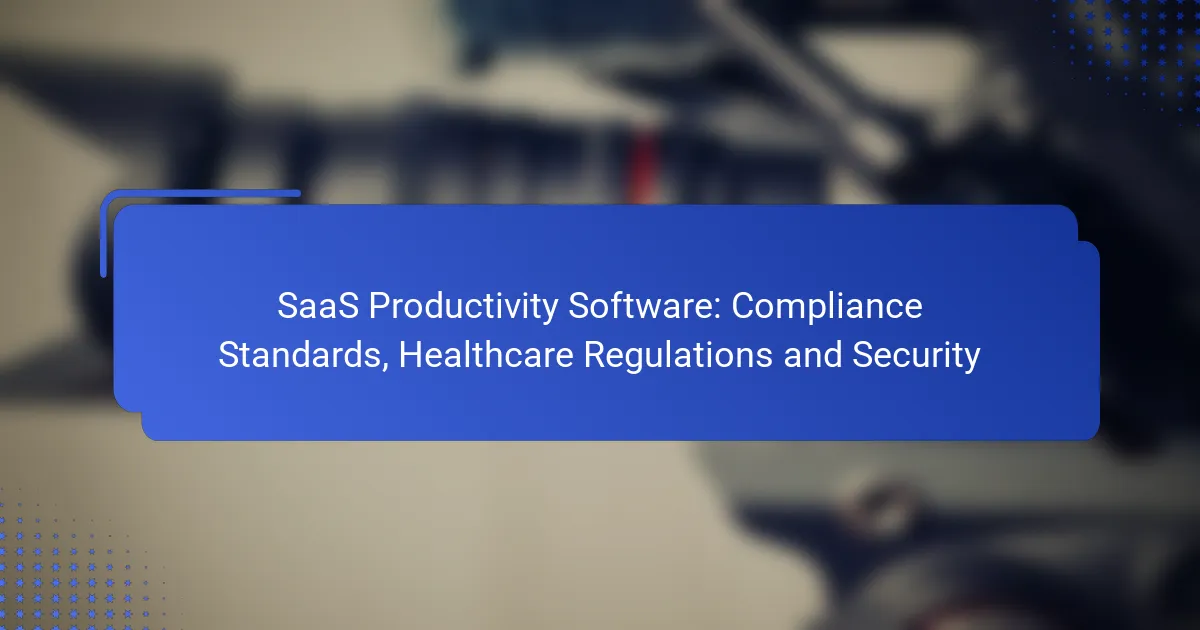SaaS productivity software plays a crucial role in helping healthcare organizations navigate complex compliance standards and regulations, such as PHIPA, PIPEDA, HIPAA, and GDPR. By integrating features like automated reporting, data encryption, and access controls, these platforms enhance operational efficiency while safeguarding sensitive patient information. Robust security measures, including multi-factor authentication and regular audits, further ensure that organizations maintain compliance and protect their data effectively.
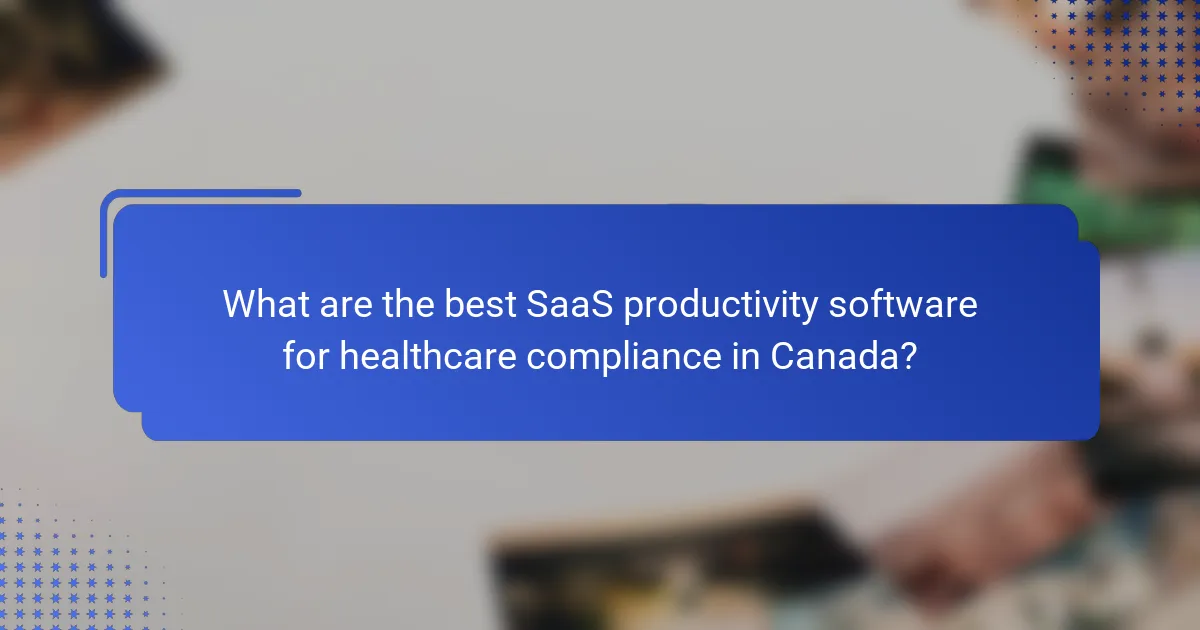
What are the best SaaS productivity software for healthcare compliance in Canada?
The best SaaS productivity software for healthcare compliance in Canada includes tools that streamline adherence to regulations like PHIPA and PIPEDA while enhancing operational efficiency. These platforms help healthcare organizations manage compliance documentation, training, and reporting effectively.
ComplianceMate
ComplianceMate is designed specifically for healthcare organizations, offering features that simplify compliance management. It provides tools for tracking regulatory changes, managing documentation, and ensuring staff training is up to date.
One of its key benefits is the ability to automate compliance reporting, which can save time and reduce errors. Users can easily generate reports that demonstrate adherence to Canadian healthcare regulations, making audits less stressful.
ComplyAssistant
ComplyAssistant focuses on risk management and compliance tracking for healthcare providers. It allows organizations to assess their compliance status and identify areas needing improvement, which is crucial for maintaining standards set by Canadian regulations.
This software offers a user-friendly interface for managing policies and procedures, along with tools for conducting internal audits. Regular updates ensure that users stay informed about the latest compliance requirements, which is vital in the ever-evolving healthcare landscape.
Zenefits
Zenefits is primarily known for its HR capabilities but also includes features that support healthcare compliance. It helps organizations manage employee records, benefits, and training, ensuring that all staff are compliant with necessary regulations.
With its integrated platform, Zenefits streamlines the onboarding process and maintains compliance documentation, which is essential for healthcare organizations in Canada. Its focus on employee management can enhance overall compliance by ensuring that all personnel are well-informed and trained on relevant regulations.
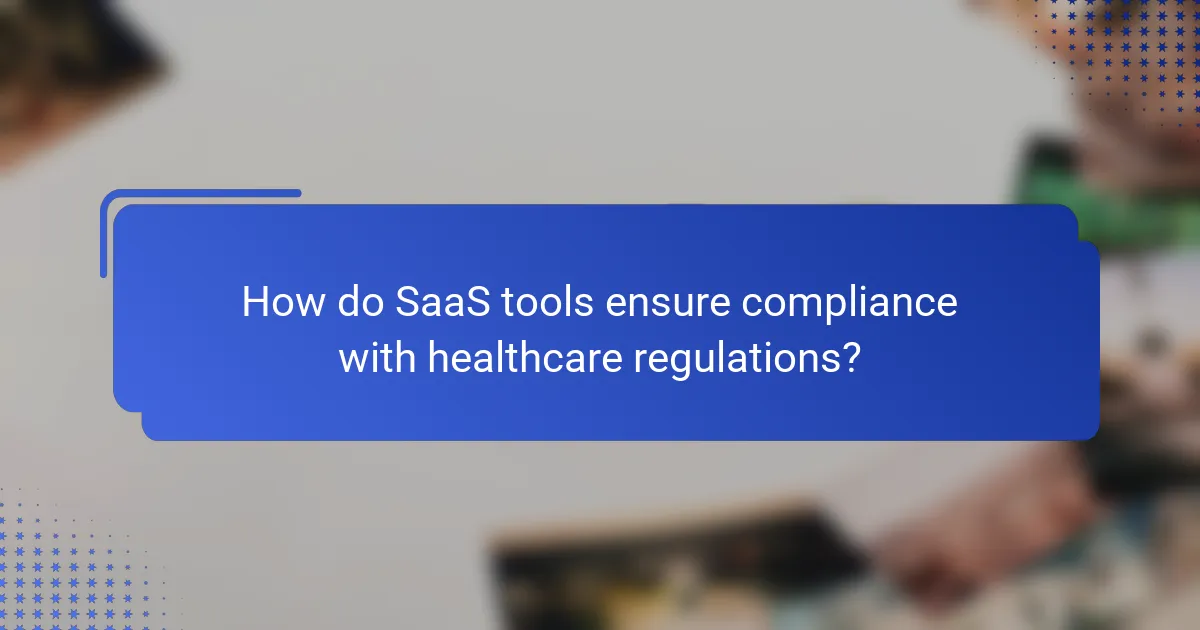
How do SaaS tools ensure compliance with healthcare regulations?
SaaS tools ensure compliance with healthcare regulations by integrating features that align with standards like HIPAA and GDPR. These features include automated reporting, data encryption, and access controls that help protect sensitive patient information.
Automated reporting features
Automated reporting features streamline the process of generating compliance reports, reducing the risk of human error. These tools can automatically collect and analyze data, ensuring that organizations meet regulatory deadlines and requirements efficiently.
For instance, a healthcare SaaS solution might generate monthly reports detailing patient data access and usage, which can be crucial for audits. This automation not only saves time but also enhances accuracy in reporting compliance metrics.
Data encryption protocols
Data encryption protocols are essential for protecting sensitive healthcare information from unauthorized access. SaaS providers typically employ encryption both at rest and in transit, ensuring that data remains secure throughout its lifecycle.
Common encryption standards include AES-256 for data at rest and TLS for data in transit. Organizations should verify that their chosen SaaS tool adheres to these protocols to mitigate risks associated with data breaches and to comply with healthcare regulations.
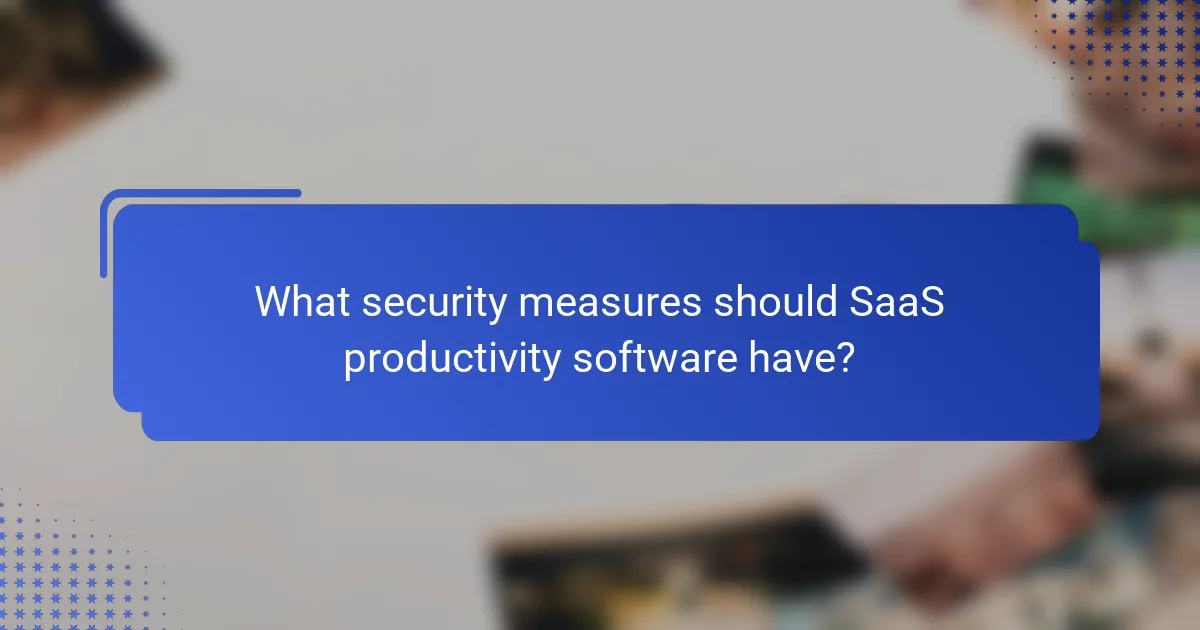
What security measures should SaaS productivity software have?
SaaS productivity software should implement robust security measures to protect sensitive data and ensure compliance with regulations. Key measures include multi-factor authentication and regular security audits, which enhance user verification and identify vulnerabilities in the system.
Multi-factor authentication
Multi-factor authentication (MFA) adds an extra layer of security by requiring users to provide two or more verification factors to gain access. This can include something they know (a password), something they have (a mobile device), or something they are (biometric data). Implementing MFA significantly reduces the risk of unauthorized access.
When choosing an MFA method, consider options like SMS codes, authenticator apps, or biometric scans. Each method has its pros and cons, such as convenience versus security level. Aim for solutions that balance user experience with strong protection.
Regular security audits
Regular security audits are essential for identifying and addressing vulnerabilities within SaaS productivity software. These audits should evaluate the software’s security policies, access controls, and data protection measures. Conducting audits at least annually can help maintain compliance with industry standards and regulations.
During an audit, focus on areas such as data encryption, user access logs, and incident response plans. Engage third-party security experts for an unbiased assessment. This proactive approach not only strengthens security but also builds trust with users and clients.
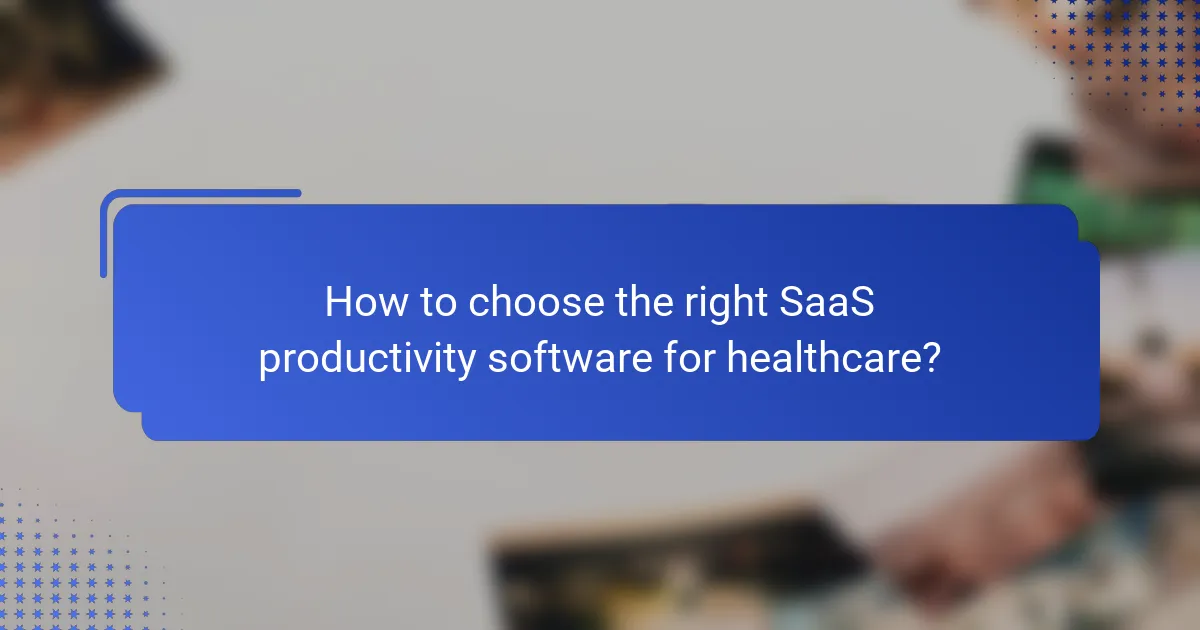
How to choose the right SaaS productivity software for healthcare?
Choosing the right SaaS productivity software for healthcare involves evaluating integration capabilities, user access controls, and compliance with regulations. Focus on solutions that enhance workflow efficiency while ensuring data security and regulatory adherence.
Evaluate integration capabilities
Integration capabilities are crucial for SaaS productivity software in healthcare, as they determine how well the software connects with existing systems like Electronic Health Records (EHR) and billing platforms. Look for software that supports standard APIs and can seamlessly integrate with commonly used healthcare applications.
Consider the level of customization available for integrations. Some software solutions offer pre-built connectors, while others may require custom development. Assess the potential costs and time involved in implementing these integrations to ensure they fit within your budget and timeline.
Assess user access controls
User access controls are essential for maintaining the security of sensitive healthcare data. Ensure the software provides role-based access, allowing you to define permissions based on user roles within your organization. This minimizes the risk of unauthorized access to confidential patient information.
Evaluate features such as multi-factor authentication and audit logs, which can enhance security further. Regularly review user access settings to adapt to changes in personnel or roles, ensuring compliance with regulations like HIPAA in the U.S. or GDPR in Europe.
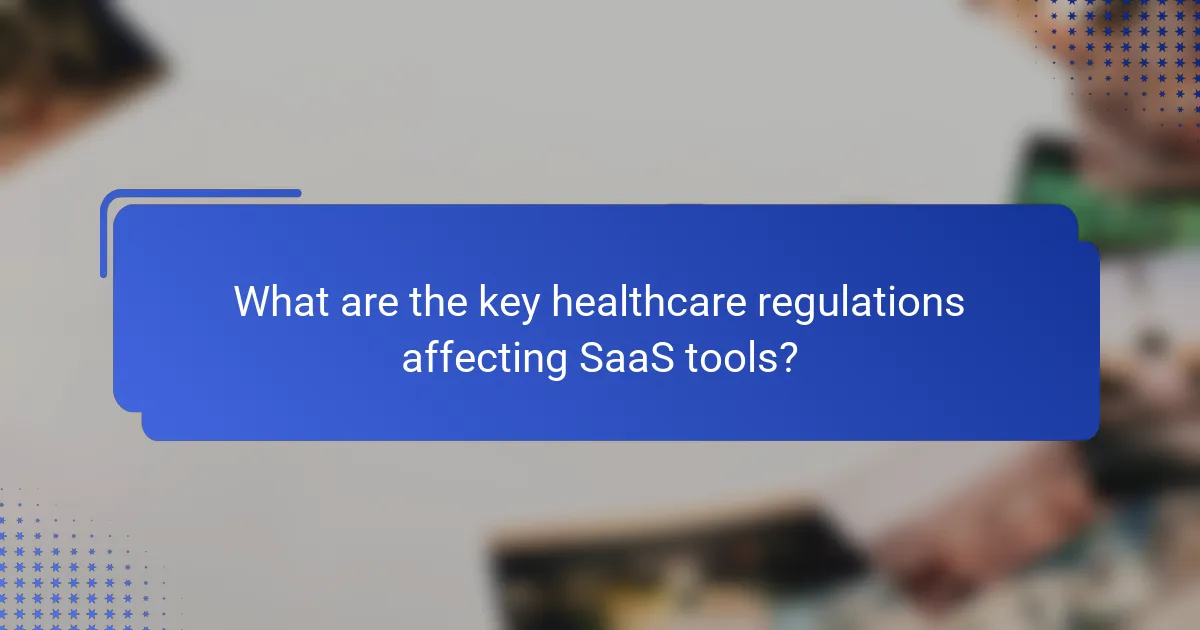
What are the key healthcare regulations affecting SaaS tools?
Key healthcare regulations impacting SaaS tools include HIPAA in the United States and PIPEDA in Canada. These regulations set standards for data protection, privacy, and security, which are crucial for any software handling sensitive health information.
HIPAA compliance
HIPAA, or the Health Insurance Portability and Accountability Act, mandates strict guidelines for protecting patient information in the U.S. SaaS providers must implement administrative, physical, and technical safeguards to ensure the confidentiality and integrity of electronic protected health information (ePHI).
To achieve HIPAA compliance, SaaS tools should conduct regular risk assessments, provide employee training on data privacy, and establish clear policies for data access and sharing. Failure to comply can result in significant fines, ranging from thousands to millions of dollars, depending on the severity of the violation.
PIPEDA adherence
PIPEDA, the Personal Information Protection and Electronic Documents Act, governs how private sector organizations in Canada collect, use, and disclose personal information. SaaS tools must ensure that they obtain consent from individuals before handling their health data and provide transparency regarding their data practices.
For PIPEDA compliance, SaaS providers should implement robust data management practices, including secure storage solutions and clear privacy policies. Organizations must also be prepared to respond to requests for information access and correction, as individuals have rights under this regulation.
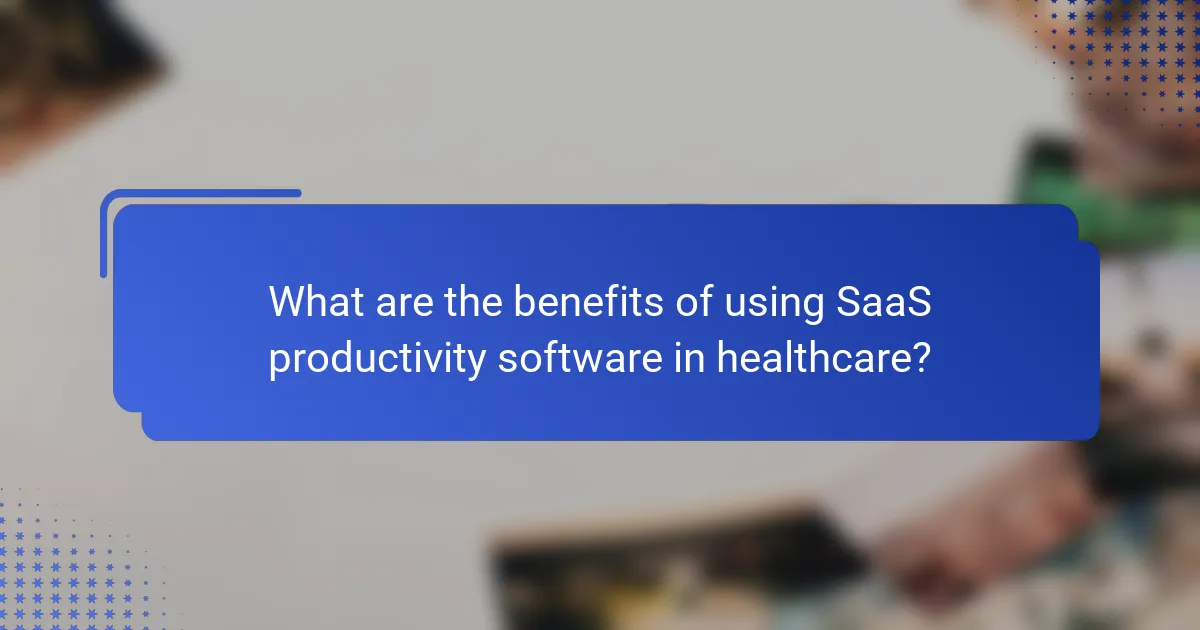
What are the benefits of using SaaS productivity software in healthcare?
SaaS productivity software offers numerous advantages for healthcare organizations, including improved efficiency, cost savings, and enhanced collaboration. By leveraging cloud-based solutions, healthcare providers can streamline operations and ensure compliance with industry regulations.
Cost efficiency
Using SaaS productivity software can significantly reduce operational costs for healthcare facilities. With subscription-based pricing models, organizations avoid hefty upfront investments in hardware and software, allowing for better budget management.
Additionally, SaaS solutions often include maintenance and updates in their pricing, which can lead to further savings. For example, a small clinic might save thousands of dollars annually compared to traditional software setups, which require ongoing IT support and infrastructure investments.
Scalability
SaaS productivity software provides healthcare organizations with the flexibility to scale their operations as needed. As patient volumes fluctuate, facilities can easily adjust their software usage without the need for extensive reconfiguration or additional hardware.
This scalability is particularly beneficial for growing practices or those experiencing seasonal demand changes. For instance, a hospital may start with a basic package and seamlessly upgrade to a more comprehensive solution as their needs evolve, ensuring they only pay for what they use.
